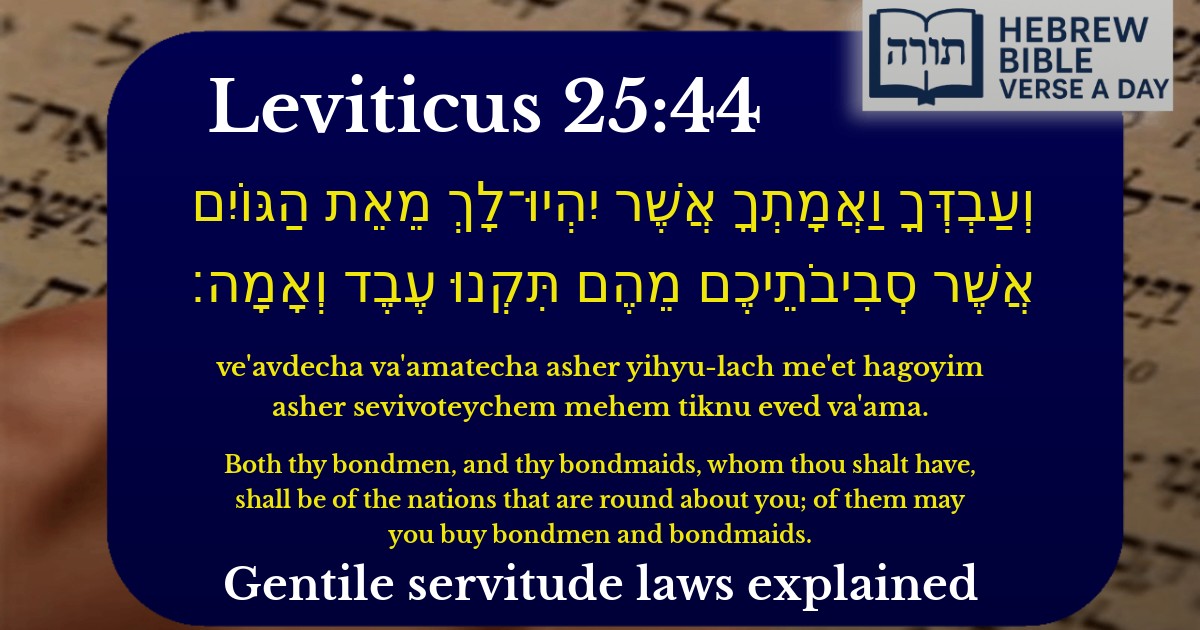Join Our Newsletter To Be Informed When New Videos Are Posted
Join the thousands of fellow Studends who rely on our videos to learn how to read the bible in Hebrew for free!
Hebrew Text
וְעַבְדְּךָ וַאֲמָתְךָ אֲשֶׁר יִהְיוּ־לָךְ מֵאֵת הַגּוֹיִם אֲשֶׁר סְבִיבֹתֵיכֶם מֵהֶם תִּקְנוּ עֶבֶד וְאָמָה׃
English Translation
Both thy bondmen, and thy bondmaids, whom thou shalt have, shall be of the nations that are round about you; of them may you buy bondmen and bondmaids.
Transliteration
Ve'avdecha va'amatecha asher yihyu-lach me'et hagoyim asher sevivoteychem mehem tiknu eved va'ama.
Hebrew Leining Text
וְעַבְדְּךָ֥ וַאֲמָתְךָ֖ אֲשֶׁ֣ר יִהְיוּ־לָ֑ךְ מֵאֵ֣ת הַגּוֹיִ֗ם אֲשֶׁר֙ סְבִיבֹ֣תֵיכֶ֔ם מֵהֶ֥ם תִּקְנ֖וּ עֶ֥בֶד וְאָמָֽה׃
וְעַבְדְּךָ֥ וַאֲמָתְךָ֖ אֲשֶׁ֣ר יִהְיוּ־לָ֑ךְ מֵאֵ֣ת הַגּוֹיִ֗ם אֲשֶׁר֙ סְבִיבֹ֣תֵיכֶ֔ם מֵהֶ֥ם תִּקְנ֖וּ עֶ֥בֶד וְאָמָֽה׃
🎵 Listen to leining
Parasha Commentary
📚 Talmud Citations
This verse is quoted in the Talmud.
📖 Gittin 38a
The verse is referenced in the discussion about the laws concerning the acquisition of non-Jewish slaves and the conditions under which they can be freed.
📖 Avodah Zarah 13b
The verse is cited in the context of discussing the permissibility of purchasing slaves from the surrounding nations and the regulations governing their treatment.


Source and Context
The verse (Vayikra 25:44) is part of the Torah's laws regarding the treatment of slaves, specifically addressing the acquisition of non-Jewish slaves from surrounding nations. This is distinct from the laws governing Jewish indentured servants, which are discussed earlier in the same chapter.
Rashi's Explanation
Rashi (Vayikra 25:44) clarifies that this verse permits purchasing slaves only from the surrounding nations ("מֵאֵת הַגּוֹיִם אֲשֶׁר סְבִיבֹתֵיכֶם"), not from the seven Canaanite nations, whom the Torah forbids keeping as permanent slaves (see Rashi on Devarim 20:16). He emphasizes that this is a permissive law, not a commandment, as the verse states "מֵהֶם תִּקְנוּ" ("may you buy") rather than an obligation.
Rambam's Legal Perspective
In Hilchos Avadim (Laws of Slaves 1:8), the Rambam codifies this law, stating that one may acquire non-Jewish slaves from other nations through purchase. However, he stresses (1:9) that even non-Jewish slaves must be treated with compassion, as the Torah mandates kindness toward all people under one's authority.
Moral and Ethical Considerations
Historical Context
The Malbim explains that this law was given when slavery was a universal practice. The Torah's approach was to regulate and humanize the institution rather than abruptly abolish it, while simultaneously teaching higher ethical standards through other mitzvos.
Halachic Restrictions
The Talmud (Kiddushin 20a) derives from this verse that one may not acquire slaves from the seven Canaanite nations. The Sifra (Behar 7:5) adds that this permission applies only when the Jewish people are dwelling in their land, as the verse specifies "round about you."